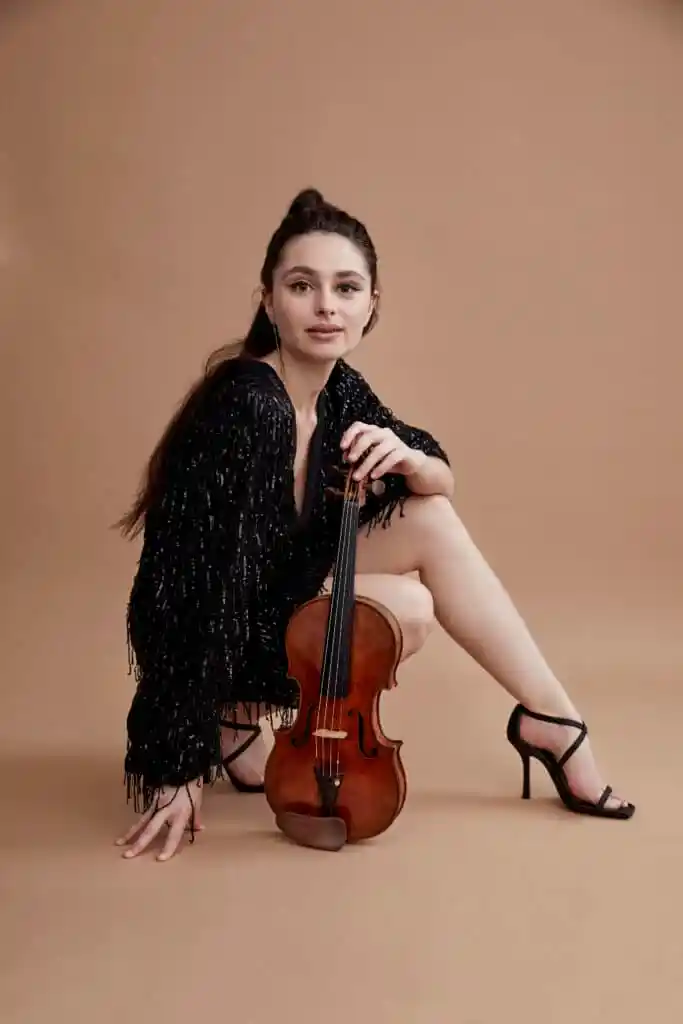TikTok violinist Esther Abrami on changing the landscape, and dress code, for LGBTQ+ people in classical music

Esther Abrami. (Supplied)
Viral TikTok violinist Esther Abrami has had to break down barriers in her career for as long as she can remember.
Although she’s been in the classical music industry for over a decade, building her career has been no small feat.
Now, with almost 400k followers on TikTok and fresh off the back of her new EP, Spotlight, where she collaborated with the UK’s first all female and non-binary string performers, HER ensemble, change has only just begun.
From forgotten female and LGBTQ+ composers to reinventing what classical music looks like, Spotlight is an ode to the perspective seldom seen in the white-male dominated industry.
As well as joining forces with HER ensemble, her new single “Reverie for violin and piano” was written by the first openly transgender Oscar nominee Angela Morley. Morley passed away in 2009 but her legacy lives on.
‘I didn’t know trans composers existed’
It was after Abrami heard her work at a HER Ensemble concert, that the pieces started to fall together.
“I fell in love with the piece straightaway.” Abrami tells PinkNews, “I was like ‘how is this not a classic of the violin repertoire? it’s not possible.’ it’s just such a stunning piece.”
“I could only have named you a handful of female composers a couple of years ago, despite being immersed in the industry for over 15 year,” Consta agrees, “I didn’t even know that any trans composers existed. I didn’t know of any composers of colour.
“It’s funny because a lot of these female composers were really famous during their time and then something happens they’re just missing from the history books. We’re not taught them, we’re not hearing their music.”
“Angela Morley was a name that I discovered when I was researching music a couple years ago,” Ellie Consta, a HER Ensemble member, tells PinkNews.
Morley became a household name in Britain in the ’50s before publicly transitioning in 1972. over the course of her career she won three Emmy awards and was nominated for Oscars in 1974 and 1976.
For both Abrami and Consta, they acknowledge that the classical music industry has a long history of gatekeeping, especially when it comes to the queer community.
“There’s so many subjects that are not talked about that are taboo,” Abrami reflects.
“For a long time, I accepted that because you don’t want to lose a job or get a bad reputation within the industry.”
Soon she was inspired by women before her such as violinist Jennifer Pike who “opened up about being a young girl coming into a majority male orchestra” or Rachel Coleman who spoke about the “judgement and stereotypes” she has faced.

Esther Abrami. (Sony Classical)
Both Abrami and Consta agree that a huge barrier in the industry is the strict dress code adhered to in traditional classical music settings.
Esther Abrami hosts a podcast titled Women in Classical where she interviews different people in the industry about their experience, and they have their latest live event in California in October.
“People felt free,” she recalls, “just to have a room where everyone could really be themselves. And we didn’t have this thing of fitting in the typical way of dressing up.
“There are times you get critics commenting on your looks, the first thing that they do is that how is that linked to the music?”
And this stringent dress code, often a white top and and long black skirt for women, most often affects queer people.
Consta says: “It’s very rare that you ever see anyone in an orchestra with tattoos, piercings, dyed hair. Anything ‘other’ is very unusual. The binary gendering of instruments and concert clothes I find difficult.
“And I feel like it’s a very easy change to make that automatically includes loads of people. It makes people feel like they can fit in those spaces.”
View this post on Instagram
In fact, Consta admits that this judgemental environment caused her to “suppress parts” of herself and her sexuality.
“It makes you think, maybe some of these composers might have identified differently, had they had the terminology or had they been allowed, I wonder? Maybe, maybe not,” Consta concludes.
This idea of freedom and inclusion is woven into the heart of both Esther Abrami and HER ensemble’s work and they are hoping it makes waves in the industry.
When HER ensemble asked followers on social media to give their own experiences, the responses were shocking.
From people being told to dye their hair to a natural colour to “hide their queerness” to being told their outfits are not “ladylike or elegant” enough.
“It’s by having these conversations that you can create a space and realise that things can be different,” Abrami says.

